专升本英语非谓语
专升本英语非谓语动词的重点
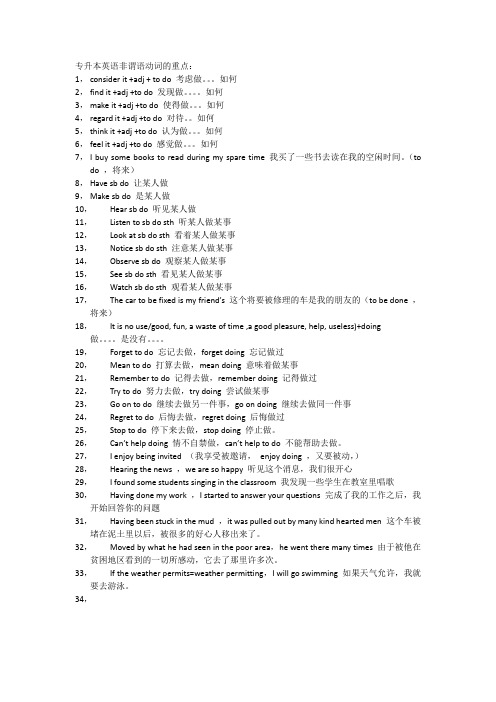
专升本英语非谓语动词的重点:1,consider it +adj + to do 考虑做。
如何2,find it +adj +to do 发现做。
如何3,make it +adj +to do 使得做。
如何4,regard it +adj +to do 对待。
如何5,think it +adj +to do 认为做。
如何6,feel it +adj +to do 感觉做。
如何7,I buy some books to read during my spare time 我买了一些书去读在我的空闲时间。
(to do ,将来)8,Have sb do 让某人做9,Make sb do 是某人做10,Hear sb do 听见某人做11,Listen to sb do sth 听某人做某事12,Look at sb do sth 看着某人做某事13,Notice sb do sth 注意某人做某事14,Observe sb do 观察某人做某事15,See sb do sth 看见某人做某事16,Watch sb do sth 观看某人做某事17,The car to be fixed is my friend’s 这个将要被修理的车是我的朋友的(to be done ,将来)18,It is no use/good, fun, a waste of time ,a good pleasure, help, useless)+doing 做。
是没有。
19,Forget to do 忘记去做,forget doing 忘记做过20,Mean to do 打算去做,mean doing 意味着做某事21,Remember to do 记得去做,remember doing 记得做过22,Try to do 努力去做,try doing 尝试做某事23,Go on to do 继续去做另一件事,go on doing 继续去做同一件事24,Regret to do 后悔去做,regret doing 后悔做过25,Stop to do 停下来去做,stop doing 停止做。
非谓语动词与独立主格结构.ppt

非谓语动词 & 独立主格结构
By Gordon
一、非谓语动词 1. 定义: 在句子中充当除谓语以外的句子成分的动词形 式叫做非谓语动词,它不受人称和数的限制。
返回
二、形式:
省略to的情况:
1. 在使役动词和感官动词后:(一感二听三看四让) feel / hear, listen to / loot at, see, watch / let, make, have, get
2. had better (not) do sth. 最好(不)做。。。 3. why not / why don't you do sth. 为什么不做。。。? 4. help sb. (to) do sth. 5. would rather do...宁愿做。。。 6. would you (please) do ... 情态动词 + do; 助动词 + do
独立主格特点: A: 用逗号 “,” 与主句分开,没有 “and”。 B: 介词with可省。 C: 在句中作状语,可改为相应的状语从句。
With one more chance given, I will make it. (独立主格)
If I am given one more chance, I will make it. (状语从句)
区别: Remember / forget / + doing(to do) Stop + doing (to do) Go on + doing (to do) Try + doing (to do)
Hale Waihona Puke 二、独立主格形式:
1. With + N + adj. 2. With + N + adv. 3. With + N + prep. 4. With + N + doing 重点 5. With + N + done 重点 6. With + N + to do 重点
专升本英语语法非谓语动词

独立主格结构的特点: 1)独立主格结构的逻辑主语与句子的主
语不同,它独立存在。 2)名词或代词与后面的分词,形容词,
副词,不定 式,介词等是主谓关系。 3)独立主格结构一般有逗号与主句分开。
I heard someone playing the violin in the next room.
A)I heard my brother (singing , sung ) in the next
room B)I heard the song (singing , sung ) in English .
My grandfather was delighted to hear that I passed my exams.
I was disappointed to learn the news.
3.作宾语补足语
重要!
We find the journey to Africa exciting.
常在see, hear, watch, feel, notice,find, discover,consider等感觉动词后或have,get, catch,leave,keep,start,send,set等使 役动词后用现在/过去分词构成的复合宾语,表 示动作进行或被动;而动词原形则表示动作的全 过程。
非谓语动词
分词
不定式
动名词
谓语和非谓语动词的区别: 不定式
非谓语动词不能单独作谓语:
作状语
Miss Mary teaches us English.
云南专升本非谓语动词的题库
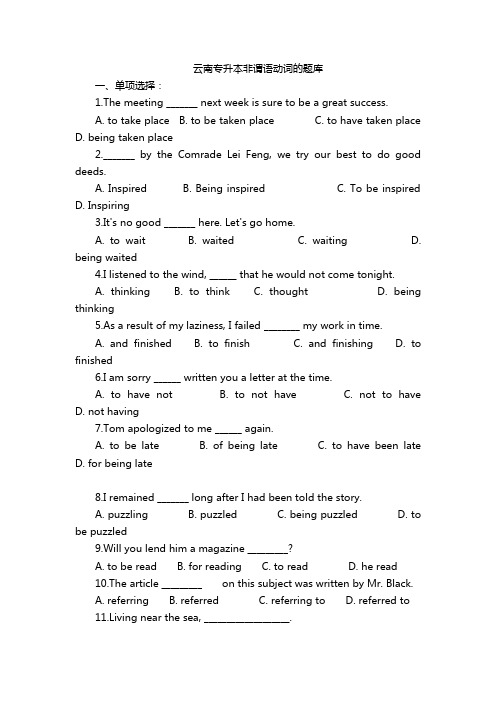
云南专升本非谓语动词的题库一、单项选择:1.The meeting _______ next week is sure to be a great success.A. to take placeB. to be taken placeC. to have taken placeD. being taken place2._______ by the Comrade Lei Feng, we try our best to do good deeds.A. InspiredB. Being inspiredC. To be inspiredD. Inspiring3.It's no good _______ here. Let's go home.A. to waitB. waitedC. waitingD.being waited4.I listened to the wind, ______ that he would not come tonight.A. thinkingB. to thinkC. thoughtD. being thinking5.As a result of my laziness, I failed ________ my work in time.A. and finishedB. to finishC. and finishingD. to finished6.I am sorry ______ written you a letter at the time.A. to have notB. to not haveC. not to haveD. not having7.Tom apologized to me ______ again.A. to be lateB. of being lateC. to have been lateD. for being late8.I remained _______ long after I had been told the story.A. puzzlingB. puzzledC. being puzzledD. tobe puzzled9.Will you lend him a magazine _________?A. to be readB. for readingC. to readD. he read10.The article _________ on this subject was written by Mr. Black.A. referringB. referredC. referring toD. referred to11.Living near the sea, ___________________.A. we enjoy healthy air and beautiful sightB. healthy air and beautiful sight is what we enjoyC. it is healthy air and beautiful sight we enjoyD. so we enjoy healthy air and beautiful sight12.__________ since the night before, I felt very hungry.A. Having not eaten anythingB. Not eating anythingC. I hadn't eaten anythingD. Not having eaten anything13.We then listened to the child ________ the article ______ on the blackboard.A. read, writingB. reading, writinC. to read, writtenD. read, writte14.________ it with me and I'll see what I can do.A. When leftB. LeavingC. If you leaveD. Leave15._________ such a chance, why don't you have a try?A. To giveB. HavingC. GivenD. Giving16.We discussed the plan that we would like to see ________ the next week.A. carry onB. carrying outC. carried outD. to carry out17._________ made them much disappointed.A. His not coming backB. Not his coming backC. He not to come backD. Not he come bac18.Five people were reported ________ in the accident.A. to be killedB. to killC. killedD. to have been killed19.I flew to Paris this morning, my assistant ________ me there this Friday.A. joiningB. to joinC. will joinD. wants to join20.He tried to calm himself, _______ .A. forceB. to forceC. forcingD. forced21.____________ , I went to the park with my uncle.A. As holidayB. Being no classesC. Since have no classesD. It being a holiday22. "Do you mind _________?" "Go ahead."A. opening the doorB. your opening the doorC. my opening the doorD. I opening the door23. I have one or two things ____________.A. to lookB. to seeC. to see toD. tolook to24._________ is bad for his health.A. Mike smokingB. Mike's smokingC. Mike's being smokingD. Mike smokes25.I came into the classroom, ______ my seat and sat down to read.A. findingB. to findC. foundD. founded26.I am tired and I don't feel like _____ any further.A. to walkB. to be walkingC. walkingD. walk27.She did nothing but ________walk in the street.A. takingB. takeC. to takeD. took28.It is a problem that doesn't need ________ right now.A. to solveB. solvingC. being solvedD. to be solving29.I ________ my handbag stolen last week.A. hadB. letC. lostD. left30.________ by a crowd of people, I felt nervous, ______ what to say.A. Watching, didn't knowB. Having watched, and not knewC. Having been watch, not knownD. Being watched, not knowing二.对比练习:1. ________many times , but he still couldn't understand it .2. ________many times , he still couldn't understand it .A. Having been told .B. ToldC. He was toldD. Though he had been told3. ________to the left , you'll find the post office .4. If you ________to the left , you'll find the post office .5. ________to the left , and you'll find the post office .A. TurningB. To turnC. TurnD. Turned6. ______from space , the earth looks blue .7.______from space , we can see the earth is blue .A. SeenB. SeeingC. To seeD. See8. The dirty clothes ______ , the girl hung them up outside .9. ______ the dirty clothes ,the girl hung them up outside .A. was washedB. washedC. were washedD. having washed10 The building ______now will be a restaurant .11. The building ______next year will be a restaurant .12. The building ______last year is a restaurant.A. having been builtB. to be builtC. being builtD. built13. He stood there ______for his mother .14. ______for two hours , he went away .A. waitingB. to waitC. waitedD. Havingwaited三、单句改错1、I dream of standing on the platform in the classroom and give lessons to lovely boys.2、Soon I began to enjoy talk to myself on paper.3、I want to thank you again for have me in your home for the summer holidays.4、My parents love me dearly of course and will do all they canmake sure that I get a good education.5、Ride bicycles can help build our bodies and bicycles are socheap that each family can afford to buy one.6、On the meeting, twenty-five advancing teachers were praisedand those who had completed thirty years of teaching were given medals.7、She kept the lamb tying to a tree during the day and went tofetch it every evening.8、I was often a little tired after a day’s work and watch TV demands very little effort.四、翻译练习1. 中国是一个发展中国家,属于第三世界(the Third World)China is a ______________ country, _______________ the Third World.2. 正在修建的这座房子将作我们的餐厅。
专升本英语语法
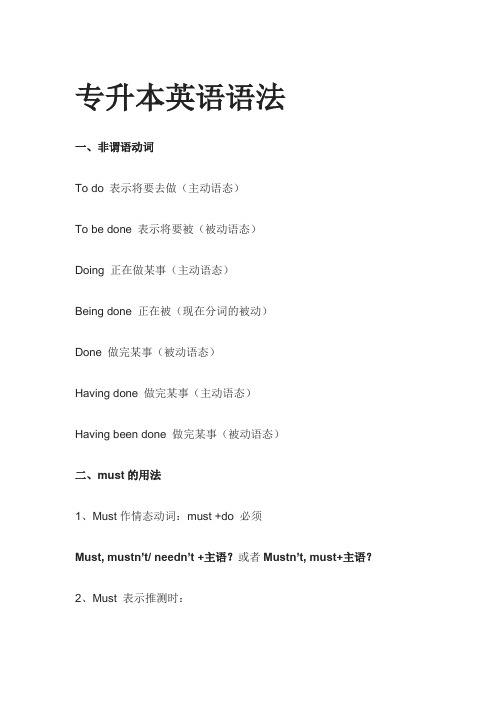
专升本英语语法
一、非谓语动词
To do 表示将要去做(主动语态)
To be done 表示将要被(被动语态)
Doing 正在做某事(主动语态)
Being done 正在被(现在分词的被动)
Done 做完某事(被动语态)
Having done 做完某事(主动语态)
Having been done 做完某事(被动语态)
二、must的用法
1、Must作情态动词:must +do 必须
Must, mustn’t/ needn’t +主语?或者Mustn’t, must+主语?
2、Must 表示推测时:
Must+do 对现在情况推测“一定是“,反义部分用Must 后面的动词Eg: he must be a teacher, isn’t he?
Must 对过去肯定的推测,must have done “一定做过某事“
如果句中有明确的过去时间,(yesterday/last week/month/year/night), 反义部分用didn't + 主语?
Eg: it must have rained last night, didn't it?
如果句中没有明确的过去时间词,反义部分用haven't /hasn't+主语?it must have rained, hasn't it?。
专升本英语语法知识点精讲
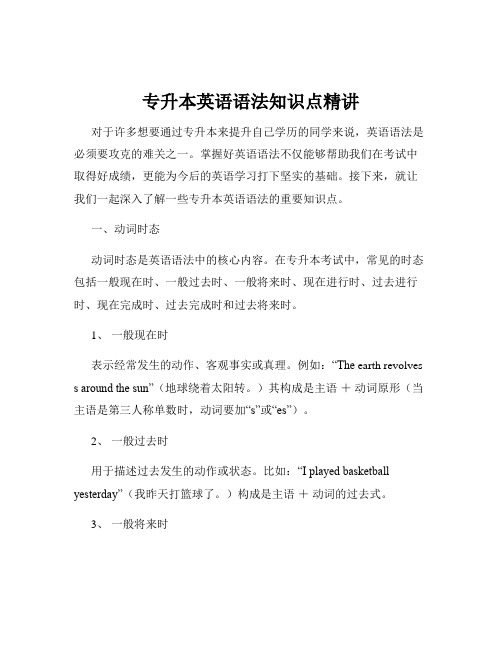
专升本英语语法知识点精讲对于许多想要通过专升本来提升自己学历的同学来说,英语语法是必须要攻克的难关之一。
掌握好英语语法不仅能够帮助我们在考试中取得好成绩,更能为今后的英语学习打下坚实的基础。
接下来,就让我们一起深入了解一些专升本英语语法的重要知识点。
一、动词时态动词时态是英语语法中的核心内容。
在专升本考试中,常见的时态包括一般现在时、一般过去时、一般将来时、现在进行时、过去进行时、现在完成时、过去完成时和过去将来时。
1、一般现在时表示经常发生的动作、客观事实或真理。
例如:“The earth revolves s around the sun”(地球绕着太阳转。
)其构成是主语+动词原形(当主语是第三人称单数时,动词要加“s”或“es”)。
2、一般过去时用于描述过去发生的动作或状态。
比如:“I played basketball yesterday”(我昨天打篮球了。
)构成是主语+动词的过去式。
3、一般将来时表示将来要发生的动作,常见的表达有“will +动词原形”和“be going to +动词原形”。
例如:“I will go to Beijing next week” (我下周要去北京。
)4、现在进行时表示正在进行的动作,结构为“be +现在分词”。
如:“She is reading a book now”(她现在正在读书。
)5、过去进行时强调过去某个时刻正在进行的动作,“was/were +现在分词”是其构成形式。
像:“I was watching TV at 8 o'clock last night” (昨晚八点我正在看电视。
)6、现在完成时表示过去发生的动作对现在造成的影响或结果,或者从过去开始一直持续到现在的动作。
“have/has +过去分词”为其结构。
例如:“I have learned English for five years”(我学英语已经五年了。
)7、过去完成时在过去某个时间点之前已经完成的动作,由“had +过去分词”构成。
专升本英语语法练习题及答案解析
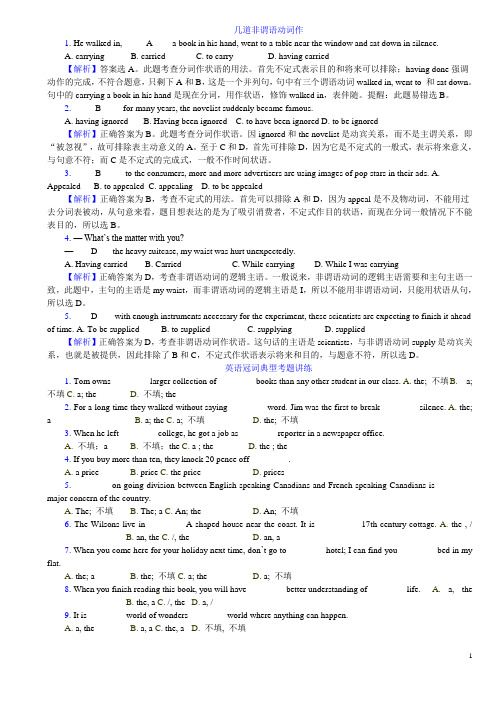
几道非谓语动词作1. He walked in, _____A____ a book in his hand, went to a table near the window and sat down in silence.A. carryingB. carriedC. to carryD. having carried【解析】答案选A。
此题考查分词作状语的用法。
首先不定式表示目的和将来可以排除;having done强调动作的完成,不符合题意,只剩下A和B,这是一个并列句,句中有三个谓语动词walked in, went to 和sat down。
句中的carrying a book in his hand是现在分词,用作状语,修饰walked in,表伴随。
提醒:此题易错选B。
2. _____B_____for many years, the novelist suddenly became famous.A. having ignoredB. Having been ignoredC. to have been ignoredD. to be ignored【解析】正确答案为B。
此题考查分词作状语。
因ignored和the novelist是动宾关系,而不是主谓关系,即“被忽视”,故可排除表主动意义的A。
至于C和D,首先可排除D,因为它是不定式的一般式,表示将来意义,与句意不符;而C是不定式的完成式,一般不作时间状语。
3. _____B_____ to the consumers, more and more advertisers are using images of pop stars in their ads. A. Appealed B. to appealed C. appealing D. to be appealed【解析】正确答案为B,考查不定式的用法。
首先可以排除A和D,因为appeal是不及物动词,不能用过去分词表被动,从句意来看,题目想表达的是为了吸引消费者,不定式作目的状语,而现在分词一般情况下不能表目的,所以选B。
云南省普高专升本公共课(公共英语)语法精讲(五):非谓语动词与独立主格

云南普通专升本公共课(公共英语)语法精讲(五):非谓语动词与独立主格学习目标:1.识别并掌握非谓语动词的三种形式。
2.掌握非谓语动词的特性和功能。
3.熟练运用独立主格结构。
动词通常在句中作谓语,那么非谓语动词顾名思义就是指这类形式的词在句中不用作谓语,而是作其他成分。
在英语中非谓语动词可分为三类:-to do,-ved,-ving。
非谓语动词的特征有以下几点:1. 它有动词的性质,即有时态和语态的变化。
Having finished his homework, he went to play baseball.The hospital being built will be completed next month.2. 它有n,adj,adv性质,即能在句中做主语、宾语、表语、定语和状语等。
Seeing is believing. 或者To see is to believe. (主语/表语)He is fond of playing snooker. (宾语)The man standing at the front of the classroom is our English teacher. (定语)Mary got home very late, only to find the guests gone.(状语)3. 它没有人称和数的变化。
The man wandering up and down the road was a robber.The men wandering up and down the road were robbers.4. 它可以带宾语、状语或修饰成分,构成相应的短语。
I didn’t expect to find you here.She is used to getting up early.Professor Ma stood there surrounded by many students.5. 它可有自己的逻辑主语。
- 1、下载文档前请自行甄别文档内容的完整性,平台不提供额外的编辑、内容补充、找答案等附加服务。
- 2、"仅部分预览"的文档,不可在线预览部分如存在完整性等问题,可反馈申请退款(可完整预览的文档不适用该条件!)。
- 3、如文档侵犯您的权益,请联系客服反馈,我们会尽快为您处理(人工客服工作时间:9:00-18:30)。
不定式(to do)
非
过去分词(-ed) -ed分词
谓 分词
语
现在分词(-ing)
动Байду номын сангаас
词
动名词(-ing)
不定式的时态和语态
时态、语态 一般式 进行式 完成式 完成进行式
主动 to do to be doing to have done to have been doing
被动 to be done / to have been done /
1.Could you tell me whether to go for a
picnic?
2.My mother showed me how to prepare mea ls.
3)“动词+宾语+不定式” 不定式可以做宾语补足语,常见的动词有:
advise , allow , appoint , arrange for , ask , consider , expect , forbid, force , invite , j udge , like ,… 1.The officer ordered his men to fire.
(补语)
after the operation.
1.不定式做主语 一般用it当形式主语,把真正的主语不定式后置。
It took me only five minutes to finish the job. 完成那个任务花去了我五分钟。 It is very difficult for him to finish the paper in su ch a short time. 在如此短的时间内完成试卷对他来说很难。
afford(负担得起), agree(同意), dare(敢于) decide(决定), happen(碰巧),hesitate(犹豫), f ail(不能),guarantee(保证), tend(倾向), mana ge(设法), pretend(假装) ,offer(提供),plan (计划)(看书上126页)…
重要的是找点事情做。
I feel it an honor ( )to speak of here.
A.to ask
B.to be asked
C.asking D.have asked
there are many interesting book( ), but I don't know which to borrow.
1. He offered to help me.
2. The student failed to pass the exam.
2)“动词+疑问词+不定式” 有些动词可以要求其后的不定式前面加一个连接副(代)词,一 起充当宾语。what,when,where,which,how,whet her等,但不可以是why。(tell, explain, show, know, de cide, explain…)
(宾语)
The
Infinitiv e
( 不
Predictive All you have to do is (to) finish it quickly (表语)
定
attribute We found a house to live in.
(定语)
She came here to study English.
动词不定式(to do)
1不定式做主语 2不定式做表语 3不定式做宾语 4不定式做宾语补足语 5不定式做定语 6不定式做状语 7不定式用法注意事项
Subject (主语) Object
To do that sort of thing is foolish. It is foolish to do that sort of thing. I want to see you this evening.
2.不定式作表语 通常表示预定要发生的动作,结构为“be+ to d o” 。
My work is to clean the room every day.
我的工作是每天清扫房间。
His dream is to be a doctor.
他的梦想是成为一名医生。
3.不定式作宾语 1) “动词+不定式”
我发现在规定的时间内答完所有的问题是不可能的。
4.不定式做定语 通常放在被修饰的词后面,往往表示未发生的动作。
I have a lot of work to do.
我有许多事要做。
There was nothing to bring home that mor ning.
那天早上(他回家时)两手空空。
A.to choose from B.to cheers
C.choose from
D.chosen
the teacher doesn't allow his students( exam
A.cheated
不定式短语在句中作定语修饰名词时,一般都 是紧跟在被修饰的名词之后做后置定语,被修 饰的名词与不定式之间可能是逻辑上的主谓关 系,也可能是逻辑上的动宾关系
He is the only person to know the truth.(主谓关 系)
他是唯一了解真相的人
The important thing is to gather some work to do. (动宾关系)
长官命令士兵开火。
2. Father will not allow us to play on the stree t.
父亲不让我们在街上玩耍。
4)“it作形式宾语” 当不定式为直接宾语,且带有宾语补足语时,应将 不定式置于补足语后面,而用it代替它。
I found it impossible to answer all the qu estions within the time given.
Adverbial (状语)
He lifted a stone only to drop it on his own feet. They jumped with joy to hear the news.
Complement The patient was warned not to eat oily food
